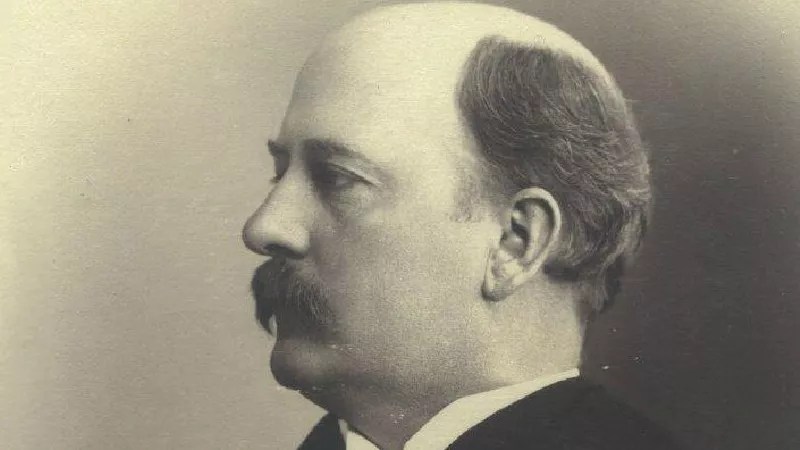
Courtesy of Tuft Special Library Collections

Audio By Carbonatix
In recent weeks, stories about sexual-harassment allegations aimed at Denver Mayor Michael Hancock, as well as state legislators Randy Baumgardner (who dodged expulsion from the General Assembly) and Steve Lebsock (who didn’t), show that even powerful figures aren’t immune from criticism over improper behavior. And that’s proving to be the case with offenders who are no longer among the living, too.
Witness the decision by Colorado College to rescind an honorary degree bestowed more than a century ago on former school president William Slocum, and the stripping of his name from a campus building. These moves were made because of what CC’s board of trustees describe as “overwhelming and uncontroverted evidence that Slocum engaged in instances of sexual misconduct and egregious sexual assault while he was president of the college.”
If anything, this last assertion is an understatement. The board of trustees’ statement about Slocum, who was in his early eighties when he died in 1934, points out that current president Jill Tiefenthaler “fully investigated” concerns about him pressed by members of the college community last fall. But the documents from the institution’s archives, plus material assembled by archivist Jessy Randall and summarized for a project dubbed “The ‘Slocum Affair’ at Colorado College,” are more than enough to establish Slocum as an inveterate creep whose behavior was widely seen as reprehensible during a period when far too many men were regularly able to mistreat women with absolute impunity.
In 1917, Slocum was forced to resign after 22 women signed affidavits about his actions – and their observations were echoed by “hundreds of women of the highest social and church standing” who were willing “to give their experiences orally but not in writing” according to James Hutchinson Kerr, a member of Colorado College’s geology, chemistry and metallurgy faculty from 1876 to 1880 who kept records on Colorado Springs-area happenings well into the next century. Yet after Slocum’s ouster, Dean Edward Parsons, who initially brought the accusations forward, was forced out, too. In response, twenty-plus faculty members resigned in protest.
Here are some excerpts from the affidavits, whose formal language in no way disguises the repulsiveness of Slocum’s behavior.
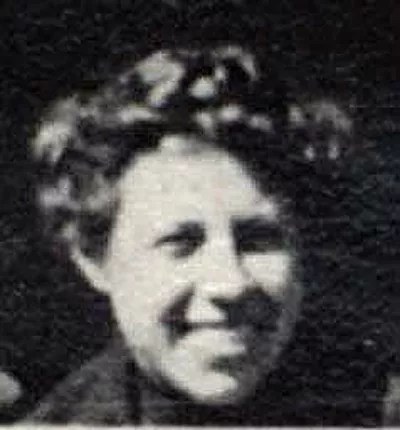
Maude Bard was in Colorado College’s class of 1912, served as Slocum’s secretary from 1912 to 1916 and later married Professor Edward Warren.
Courtesy of Tuft Special Library Collections
Maude S. Bard
Colorado College class of 1912, secretary to the president 1912-1916, later wife of CC professor Edward R. Warren
“When I came to the College in the spring of 1908, was warned by Miss Stevenson, as to what I should expect from the President.
“When I returned in September, 1912, Mrs. Bushee also warned me, as she, too, had had to protect herself against Mr. Slocum.
“At first I felt the protestations of love for me were genuine, and that it was incumbent upon me, to try to save him from himself, and to save his self-respect. It gradually dawned upon me that I was dealing with a man of strong and evil passions and that my only effort must be to protect myself.
“As two evidences of the struggle which ensued, I cite the following:
“One afternoon in the Spring of 1913, in the President’s office, at Palmer Hall, Mr. Slocum took me by the shoulders, forced me to stand against the east wall of his office, and pressed his whole body against mine, especially emphasizing the pressure at the portion of his body and mine most calculated to arouse and satisfy physical passion. I struggled to free myself, and fled from the office. This particular form of bestiality he never attempted again.
“On commencement day of this year, June 9, 1915, I was in the library of the President’s home, when I fainted. A doctor was summoned, who directed I should lie on the couch, until my own doctor could come to me. A woman friend was left to watch me, while Mr. & Mrs. Slocum went to the Alumni Banquet at Cossitt Memorial. Between courses the President came to his house to see me. Bending over the couch, with back to the other persons in the room, he inserted his hand under the clothing covering my chest, and stating that the doctor had told him to watch my heart action, passed his hand again and again over me, as far down as he could reach. I tried to protect myself by pushing him away as much as my condition would permit. The next day he reminded me of this effort on my part, and told me I had been a prude. This happened at my home on the next morning after I had fainted. Mr. Slocum called to see me and was left alone with me. I was in bed being too weak to get up. He repeated the insult of the day before, still under the cover of the necessity of watching the heart action. Then suddenly he stooped over me, laid his hand on my chest, and exclaimed, ‘Oh, I love you so!’
“These are two or three instances of the President’s persecution of a woman who works for him. I can give others, but none more flagrant. I also know, from my personal observation, that the women students in the college are not safe alone with the President in his office.”
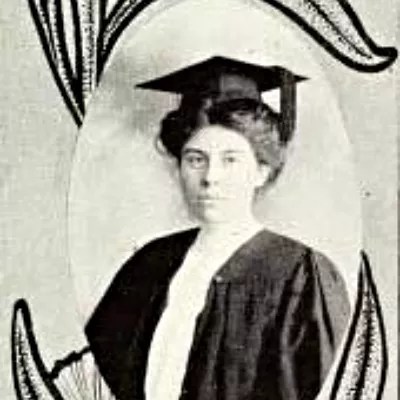
Jean Auld was part of Colorado College’s class of 1908 and worked as an instructor in Greek and Latin from 1909-1911.
Courtesy of Tuft Special Library Collections
Jean Auld (Supplement of Miss Bard’s statement)
Colorado College class of 1908, instructor in Greek and Latin 1909-1911
“Yes, I remember the incident you speak of, though of course I couldn’t see it all. I remember I was astonished and shocked at his manner. He sat down on the couch beside you, as I recall it, and bent down over you very close while he felt your pulse. Then he remarked that he was a physician, too, and added something in an undertone which I couldn’t catch. I then saw him thrust his hand under your clothes to feel your heart. That of course was all I could see, except your expression of repugnance.”
Harriet Sater
Colorado College cashier 1910-1918
“To feel that I have not only been insulted once, but many times, has been a thing which I have had to live with mentally. I have had to put up with ‘handling,’ insinuating looks and insidious familiarities, in many of the private interviews which I have had with him, in obeying his wanting ‘to see me for a few minutes.’ I am unable to express the looks which have left me boiling with a sense of shame and disgrace. The constant need of having his hand on your body, feeling it, are things a woman cannot mistake. A constant desire to always bring the physical side in is always present. … Another illustration…at the end of a normal conversation, when he asked me if I was engaged, I answered ‘No,’ and like a flash the lights were turned off, and before I was aware of what was happening, I was seized in his arms, and he said, ‘You have got to kiss me.’ The lights were turned off another time, but the second time I was prepared. … I have been talked to [with] ‘cold-heartedness,’ which was purely in a physical way.”
Anonymous graduate
“I sat quite close to his desk in the chair he placed for me. In the midst of the conversation he suddenly stopped, and leaning down, began to look at me in a way which I cannot describe in any words save bestial. … I left the room at once. He simply sat at his desk and watched me go. I was never alone with him after that…such a man has no right to occupy a position of power over the lives of young men and young women, who are bound to hold him in honor and respect.”
Anonymous student
“The first act of President Slocum which attracted my attention was a too minute and familiar examination of a brooch I was wearing. Soon after that he had me blot checks for him on several occasions. … He said he would find out when I was scheduled for office work and sign checks at those times. On these occasions he seemed to wish the door to his office closed, wanted me to sit very near him, and would look at my wrist watch now and then, each time laying his hand on my hand or wrist. … The expression of the man’s eyes, when he looked at me, offended and horrified me. These instances appear trivial to my reason, but…I have lain awake nights with the thing on my mind.”
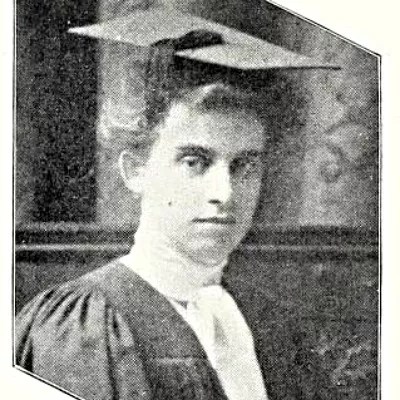
Florence Leidigh was part of Colorado College’s 1902 class and served as the dean of women’s assistant.
Courtesy of Tuft Special Library Collections
Florence Leidigh
Colorado College class of 1902, assistant to Dean of Women Ruth Loomis
“During the early days of my freshman year, I was horrified at the discovery that the College’s President was a man who made shocking advances to students and other women. One of my intimate friends…told me of her fear at being left alone with Dr. Slocum, even for a moment. If so left in a room of his own home, she was invariably made to submit to the most startling caresses. My greatest shock, however, came with the knowledge that the President, almost every evening, was in the closed rooms of one of the officials of the girls’ hall – often remaining until after midnight. … I could continue indefinitely with tales of young girls who had horrifying experience with their president: one in a public train, another in a closed carriage….”
Anonymous former secretary to the president
“Twice, much against my will, I was obliged to telephone (in Mrs. Slocum’s absence) for Miss [name not given in transcription] to come down from [place not given] on ‘important business.’ Mrs. [name not given] told me that Miss [name not given] spent the night at the Slocum house. When Miss [name not given] was in evidence, I was moved into another office…to get me out of the way.”
Anonymous former instructor
“Of course I have known for a long time that Pres. Slocum has a most disgusting attitude toward women who are unsuspicious, young and thrown into contact with him. … Dr. Slocum made himself extremely disagreeable to me for the first few weeks, cropping into my room in [name not given], late in the evening, and saying many sentimental and silly things. I was young then and felt very guilty, as though I had brought such familiarity on myself, and I finally asked [name not given] about it. She told me that the experience was fairly common. … By never staying in my room alone in the evening the difficulty finally relieved itself. … I could not repeat anything he said. The impression of him, however, is a very horrid one, and the trapping feeling when he took advantage of his age and position and his friendship for my family, I can assure you I have never forgotten.”
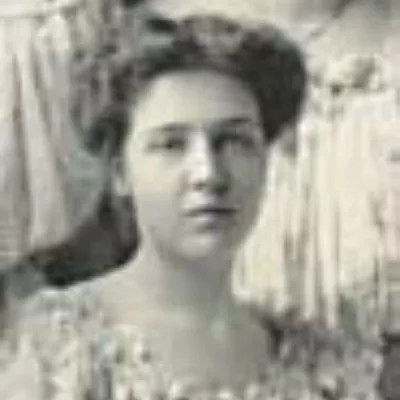
Irma Persons was the wife of Warren Persons, Colorado College’s Dean of Business Administration from 1912 to 1918.
Courtesy of Tuft Special Library Collections
Irma K. Persons
Wife of Warren Persons, Dean of Business Administration 1912-1918
“[After a college dinner at the Acacia Hotel, Mrs. Persons accompanied an injured Mrs. Slocum home. When Mrs. Slocum was settled, she entered a dark room with Dr. Slocum to get her coat.] He put his arm around me and then the first thing I knew he kissed me, on the mouth, and in the act our eyeglasses became entangled. He turned on the lights to find our glasses and I got out of the room. He was all this time calling me endearing terms. … He wanted to take me home, but I insisted on being taken back to the hotel, where Mr. Persons was. From his house to the hotel he drove just as slowly as was possible, all the while calling me endearing names, trying to hold my hand…and several times he put his arms around me.”
After Slocum was booted from Colorado College, memories of his misdeeds faded into the background, but they weren’t entirely forgotten. Indeed, “The ‘Slocum Affair’ at Colorado College” documents a number of times when new generations discovered his shameful legacy, including accounts in author Charlie Brown Hershey’s 1952 historical work Colorado College 1874-1949 and J. Juan Reid’s Colorado College: The First Century, 1874-1974, published in 1979.
Just shy of twenty years later, Fulbright scholar and visiting mathematics professor John Fauvel revisited the tale in the context of President Bill Clinton’s peccadilloes for an article titled “Monicagate on Cache La Poudre St: The end of the golden age of Colorado College.” And 2010 brought a piece in the University of Nebraska’s Great Plains Quarterly by Joe P. Dunn labeled “Scandal on the Plains: William F. Slocum, Edward S. Parsons and the Colorado College Controversies.” Dunn and the late Fauvel are both thanked for their scholarship in the board of trustees’ statement.
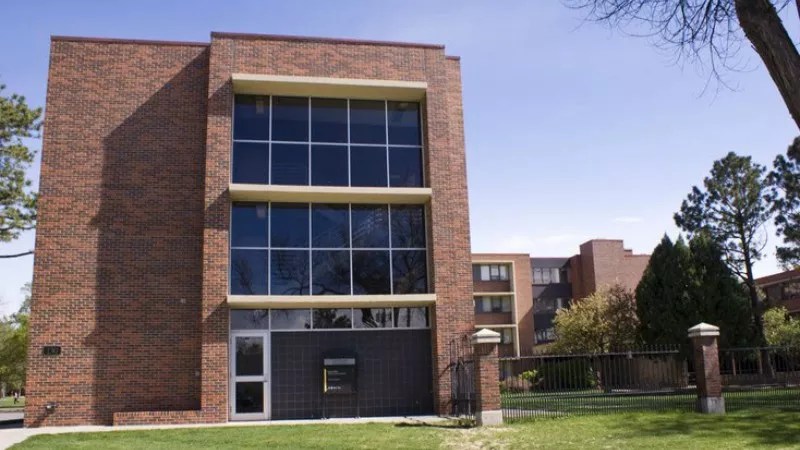
Slocum’s name has been removed from this residence hall and commons building.
Courtesy of coloradocollege.edu
The residence hall’s continuing use of Slocum’s moniker became a new focus in March 2014 via “Slocum the Lecher: The Troubling History of Our Dorm’s Namesake,” written by Alta Viscomi and published in Cipher. But it took the offenses of a certain disgraced movie executive to truly push the issue onto the front burner. Witness “The Harvey Weinstein of Colorado College,” an offering from The Chronicle of Higher Education that put archivist Randall in the spotlight.
As demands to strip Slocum’s handle off the residence hall grew, CC president Tiefenthaler and the board of trustees began their inquiry. They’ve now announced that the residence hall in question will be known as South Hall and South Commons for the next year or two, after which the board will initiate a procedure to come up with a new name.
“Because Slocum also accomplished important and necessary achievements for the college during his tenure, for which he had been recognized as one of our greatest presidents, the board has asked President Tiefenthaler to form a committee of students, faculty, staff and trustees to recommend ways to represent his full legacy on campus,” the announcement points out. “This should include considering the appropriate placement of his portrait that currently hangs in Palmer Hall. Consistent with our mission and values, the college should ignore neither his accomplishments nor his disturbing flaws.”
The committee’s recommendations are due by June 15. In the meantime, the board stresses that it took the actions it has to date “because sexual assault and sexual harassment are unacceptable today, and were unacceptable in Slocum’s time. Such behavior is in direct conflict with our mission and values, and must neither be tolerated nor overlooked.”
Click to access the William Slocum handwritten statements and the William Slocum typed statements.